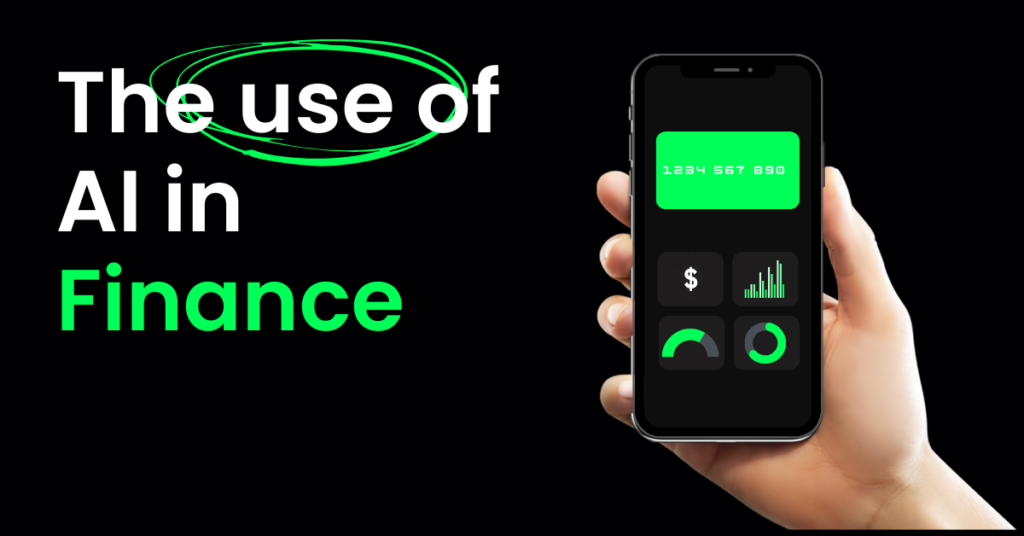
Welcome to an exciting era where artificial intelligence (AI) is revolutionizing the financial industry. In this article, we will explore how AI is used in finance, such as enhancing customer service, detecting fraud, optimizing portfolio management, and more. With the help of sophisticated algorithms and data analytics, AI is introducing new possibilities and transforming the way financial services are delivered.
As you dive deeper into this exploration of AI in finance, you will discover the various ways in which AI is used in the financial sector and the exciting opportunities that lie ahead.
How AI is Used in Finance: Key Takeaways
- AI is revolutionizing the financial industry and paving the way for new possibilities.
- The role of AI in financial analysis is transforming traditional methods and providing valuable insights.
- AI-powered financial services are enhancing customer experiences, automating processes, and reducing costs for financial institutions.
- AI algorithm trading is improving trading efficiency, increasing accuracy, and reducing human error.
- AI-driven risk management is improving the overall stability and security of the financial system.
The Role of AI in Financial Analysis
Financial analysis is a critical aspect of the financial industry that involves examining financial data to identify trends, patterns, and insights that can inform decision-making processes. With the advent of artificial intelligence (AI), financial analysis has been transformed by the ability of machine learning algorithms to analyze vast amounts of financial data.
AI is increasingly being used for financial analysis, creating a new paradigm in the world of finance. With AI, financial institutions can automate processes, reduce errors, and gain valuable insights into customer behavior and market trends. The result is better-informed decisions and improved profitability.
AI for Financial Analysis
The use of AI for financial analysis has opened up new avenues for data analytics in finance. AI algorithms can process large and complex data sets and identify patterns that would be difficult or even impossible for humans to detect.
Machine learning models can analyze historical financial data to identify trends and make predictions about future market movements. This information is invaluable for traders and investors, helping them to make informed decisions about buying and selling securities.
Data Analytics in Finance
Data analytics in finance has been transformed by the availability of advanced data mining and modeling tools. With AI, financial institutions can analyze data from multiple sources, including social media, news outlets, and financial reports, to gain insights into emerging market trends and customer behavior.
By identifying patterns in customer spending habits, financial institutions can develop personalized financial products and services, improve customer satisfaction, and increase profitability. AI-powered financial analysis is also being used for fraud detection, risk management, and compliance monitoring, helping to create a more stable and secure financial system.
“AI is transforming financial analysis by improving the accuracy, efficiency, and scope of data analysis, revolutionizing the way financial institutions operate.”
The use of AI for financial analysis is still in its early stages, but the potential for transformative impact is enormous. As AI technologies continue to mature, we can expect to see even more sophisticated tools and applications that will further revolutionize the world of finance.
AI in Banking and Finance
AI is transforming the banking and finance industry, with AI-powered financial services becoming increasingly popular. As a customer, you are likely to interact with AI systems during your banking experience, whether through online chatbots or voice-activated virtual assistants. Financial institutions are also leveraging AI to automate processes and improve operational efficiency.
One of the most common applications of AI in banking and finance is fraud detection. Machine learning algorithms can analyze vast amounts of data to detect unusual patterns and identify potential fraudulent activities. This not only helps financial institutions to prevent fraud but also enhances their reputation and improves customer confidence.
Another example of AI in banking is credit scoring, where AI algorithms can analyze customer data and predict creditworthiness more accurately than traditional credit scoring methods. This can help financial institutions to make more informed lending decisions and provide better services to their customers.
| AI Applications in Banking and Finance | Benefits |
|---|---|
| Fraud detection | – Prevents fraud and enhances reputation |
| Credit scoring | – More accurate creditworthiness predictions |
| Chatbots and virtual assistants | – Improved customer experiences |
| Process automation | – Increased operational efficiency |
Overall, AI is revolutionizing the banking and finance industry by enhancing customer experiences, automating processes, and reducing costs for financial institutions. As AI continues to evolve, we can expect even more innovative applications in the future.
AI Algorithm Trading: The Future of Financial Markets
Artificial intelligence (AI) is revolutionizing the way financial markets operate. AI algorithm trading uses machine learning models to analyze vast amounts of financial data and make complex trading decisions. This technology is transforming the financial industry by improving trading efficiency, accuracy, and reducing human error.
The use of AI algorithm trading is widespread in global financial markets, with many financial institutions and hedge funds leveraging this technology to gain a competitive advantage. These algorithms are able to analyze market data in real-time, identify patterns, and make informed trading decisions based on historical data.
| Benefits of AI Algorithm Trading | Challenges of AI Algorithm Trading |
|---|---|
|
|
While there are many benefits to the use of AI algorithm trading in financial markets, there are also ethical considerations and challenges that need to be addressed. It is imperative that these algorithms are used responsibly and in compliance with regulatory standards to ensure the safety and stability of the financial system.
The use of AI in financial markets is still a relatively new development and its impact on the industry is yet to be fully realized. However, it is clear that AI algorithm trading is the future of financial markets, providing valuable insights, improving efficiency, and transforming the financial industry in ways that were once unimaginable.
Related Post: The Best AI-Powered Sales Tools for Optimizing Revenue
AI-Driven Risk Management
As the financial industry continues to evolve, managing risk has become increasingly complex. AI-driven risk management is the latest breakthrough in this area, leveraging machine learning algorithms to identify, monitor, and mitigate financial risks more effectively.
One of the main advantages of AI in risk management is its ability to process vast amounts of data quickly and accurately. By analyzing historical data and market trends, AI algorithms can predict potential risks and provide real-time insights, empowering financial institutions to make informed decisions and respond promptly to emerging threats.
AI-driven risk management is also enhancing the accuracy and consistency of risk assessments. By automating the process of data collection and analysis, AI reduces the risk of human error and bias, ensuring that risk assessments are objective and reliable.
The Benefits of AI-Driven Risk Management
The benefits of AI-driven risk management are numerous, including:
- Improved efficiency and speed of risk assessments
- Enhanced accuracy and reliability of risk assessments
- Real-time monitoring and prediction of potential risks
- Reduced human error and bias in risk assessments
- Increased cost-effectiveness of risk management
Real-World Applications of AI in Risk Management
AI-driven risk management is already being used in various financial institutions, with impressive results.
| Financial Institution | AI Application | Benefits |
|---|---|---|
| JP Morgan | Contract review | Reduced review time by 360,000 hours annually, saving millions of dollars |
| Goldman Sachs | Credit risk assessment | Improved accuracy of credit decisions and reduced risk of defaults |
| ICICI Bank | Fraud detection | Reduced fraud losses by 40% and improved customer experience |
As AI technology continues to advance, we can expect to see even greater applications of AI-driven risk management in the financial industry. However, it is essential to remember that AI should not replace human decision-making entirely. Rather, it should be used as a tool to supplement and enhance human expertise.
“AI-driven risk management is empowering financial institutions to make more informed decisions and respond more quickly to emerging threats.”
The Impact of AI on Financial Services
Artificial Intelligence (AI) is transforming the financial services sector in significant ways. Its implementation in various areas of finance has led to increased efficiency, personalized services and improved security. In this section, we will explore the various applications of AI in finance, with a focus on machine learning, and how these applications have impacted financial services.
Machine Learning in Finance
Machine learning is a branch of artificial intelligence that involves creating algorithms capable of learning and evolving from data. In finance, machine learning is being used to analyze large datasets to uncover patterns, make predictions and optimize decision-making processes.
One key area where machine learning is having a significant impact is fraud detection. Financial institutions are using machine learning algorithms to identify and prevent fraudulent activities in real-time. This has greatly improved the security of financial transactions for customers.
AI Applications in Finance
AI applications in finance are varied and include areas such as chatbots, virtual assistants, and robo-advisory services. Chatbots are being used for customer service, enabling customers to have their queries addressed at any time of the day or night. Virtual assistants are being used as financial advisors, offering personalized investment advice to customers. Robo-advisory services are being used to optimize portfolio management, minimize risks, and maximize returns.
Another area where AI is being implemented is credit scoring. AI-based credit scoring models are being used to analyze large datasets, enabling financial institutions to make more informed credit decisions. This has made it easier and quicker for individuals and small businesses to obtain loans.
Impact of AI on Financial Services
The impact of AI on financial services has been significant. AI-based systems have increased efficiency, improved customer service, and reduced costs for financial institutions. AI-powered chatbots and virtual assistants have enabled customers to have their queries addressed quickly and at any time, making banking more convenient for them. AI-based fraud detection systems have improved the security of financial transactions, reducing the risk of financial loss for customers and financial institutions. Machine learning-based credit scoring models have made it easier for individuals and small businesses to obtain loans, leading to greater financial inclusion.
However, the implementation of AI in financial services has also brought ethical considerations. The use of AI algorithms and data analytics raises concerns about privacy, security, and potential biases in decision-making processes. It is important for financial institutions to ensure responsible use of AI and to address these challenges to build trust with their customers.
AI is transforming the financial services sector in significant ways, improving efficiency, personalization, and security. Machine learning algorithms are being used to make predictions and optimize risk management decisions. AI-powered chatbots and virtual assistants are improving customer service, while AI-based fraud detection systems are enhancing the security of financial transactions. Despite these benefits, there are also ethical considerations surrounding the use of AI in financial services. It is important for financial institutions to use AI responsibly and address these challenges to build trust with their customers.
Ethical Considerations and Challenges of AI in Finance
As AI continues to transform the financial industry, ethical considerations and challenges have emerged. One of the main concerns is the use of AI for financial analysis and data analytics in finance. While these technologies have the potential to revolutionize decision-making and improve outcomes, they also raise questions about data privacy, security, and bias.
AI algorithms rely on vast amounts of data to learn and make predictions. However, this data can be sensitive and personal, raising concerns about privacy and data protection. In addition, there is the risk of data breaches or cyber attacks, which could compromise the security of financial systems and put individuals and institutions at risk.
Another issue is the potential for AI algorithms to perpetuate biases and discrimination. Machine learning models are only as unbiased as the data they are trained on, and if that data contains biases, the algorithm can perpetuate them. This could result in discriminatory practices, such as denying loans or insurance based on factors such as race or gender.
Finally, there is the concern that AI and automation could lead to job displacement in the financial industry. While AI can improve efficiency and reduce costs, it could also lead to job losses, particularly in areas such as customer service and data entry.
Responsible Use of AI in Finance
Despite these challenges, the responsible use of AI in finance is possible. To address privacy and security concerns, financial institutions can implement strict data protection protocols and invest in cybersecurity measures. They can also work to ensure that AI algorithms are transparent and explainable, so that individuals can understand how decisions are being made.
To address concerns about bias, financial institutions can take steps to ensure that their data is diverse and representative. They can also implement regular audits and tests to identify and correct any biases in their AI models.
Finally, financial institutions can work to reskill and upskill their employees to support the integration of AI and automation in the financial industry, ensuring that they are not left behind in the transition.
“The ethical use of AI will be critical to the continued success of the financial industry.”
As the financial industry continues to embrace AI, it is important to address the ethical considerations and challenges that arise. By implementing responsible use practices and investing in education and training, the financial industry can ensure that AI is used to its full potential, while also protecting individuals and institutions from potential risks.
Ethical Considerations and Challenges
However, as with any new technology, there are also ethical considerations and challenges that must be addressed. It is essential to use AI algorithms and data analytics responsibly and consider their potential impact on privacy, security, and human employment. Financial institutions must ensure they are transparent and accountable in their use of AI and actively work to minimize any potential negative consequences.
In conclusion, AI is changing the face of finance, and it is an exciting time to be involved in this industry. With careful consideration and responsible implementation, we can take advantage of AI’s full potential to create a more efficient, personalized, and secure financial system.
Related Post: The Ultimate Guide to the Best AI Marketing Tools for Business Growth in 2024
Conclusion
Congratulations on completing this exploration of how AI is used in finance. We have seen how artificial intelligence is being used in finance for applications such as financial analysis, banking and finance, algorithm trading, risk management, and financial services.
As we move forward into this new era of AI-powered finance, we can expect to see even more exciting advancements and possibilities. The use of AI algorithms and data analytics will continue to improve decision-making processes and enhance customer experiences while reducing costs and increasing efficiency for financial institutions.
FAQ
How is AI used in finance?
AI is used in finance to revolutionize various aspects of the industry. It is employed in financial analysis, banking and finance services, algorithmic trading, risk management, and many other areas. AI technologies such as machine learning and data analytics are harnessed to enhance decision-making processes, automate tasks, and improve customer experiences.
What is the role of AI in financial analysis?
AI plays a crucial role in financial analysis by leveraging machine learning algorithms and data analytics to analyze vast amounts of financial data. This enables financial professionals to gain valuable insights, assess market trends, and make informed decisions. AI-powered financial analysis enhances accuracy, efficiency, and effectiveness in evaluating investment opportunities, managing portfolios, and predicting market movements.
How is AI implemented in banking and finance?
AI is implemented in banking and finance through various applications that enhance customer experiences, automate processes, and reduce costs. AI-powered financial services, such as chatbots and virtual assistants, provide personalized support and assistance to customers. Additionally, AI is utilized for fraud detection, credit scoring, risk management, and optimizing operational efficiency within financial institutions.
What is AI algorithm trading?
AI algorithm trading involves the use of sophisticated machine learning algorithms to make complex trading decisions. These algorithms analyze vast amounts of financial data, identify patterns, and execute trades accordingly. AI algorithm trading aims to improve trading efficiency, increase accuracy, and reduce human error in the financial markets.
How does AI-driven risk management work?
AI-driven risk management utilizes machine learning models to identify and mitigate financial risks. These models analyze historical data, market trends, and other relevant information to assess potential risks and develop risk mitigation strategies. By leveraging AI, risk management processes become more effective, timely, and comprehensive, enhancing the stability and security of the financial system.
What are the applications of AI in financial services?
AI has a wide range of applications in financial services. It is employed in customer service chatbots, fraud detection systems, automated investment advisors, credit scoring models, and compliance monitoring tools. These AI applications improve the efficiency, personalization, and security of financial services, making them more responsive to customer needs.
What are the ethical considerations and challenges of AI in finance?
The use of AI in finance raises ethical considerations and challenges. Responsible use of AI algorithms and data analytics is crucial to ensure fairness, transparency, and privacy. Additionally, there is a need to address concerns regarding job displacements due to automation and the potential biases embedded in AI systems. The financial industry must navigate these challenges and prioritize ethical implementation of AI technologies.
What are the key takeaways from AI in finance?
AI has emerged as a transformative force in the financial industry, revolutionizing various sectors such as financial analysis, banking, trading, risk management, and customer services. By harnessing the power of AI technologies like machine learning and data analytics, the financial industry has improved decision-making processes, enhanced efficiency, and advanced customer experiences. The possibilities for AI in finance are vast, and the industry must embrace responsible and ethical practices to fully leverage the potential of AI in this new era.

